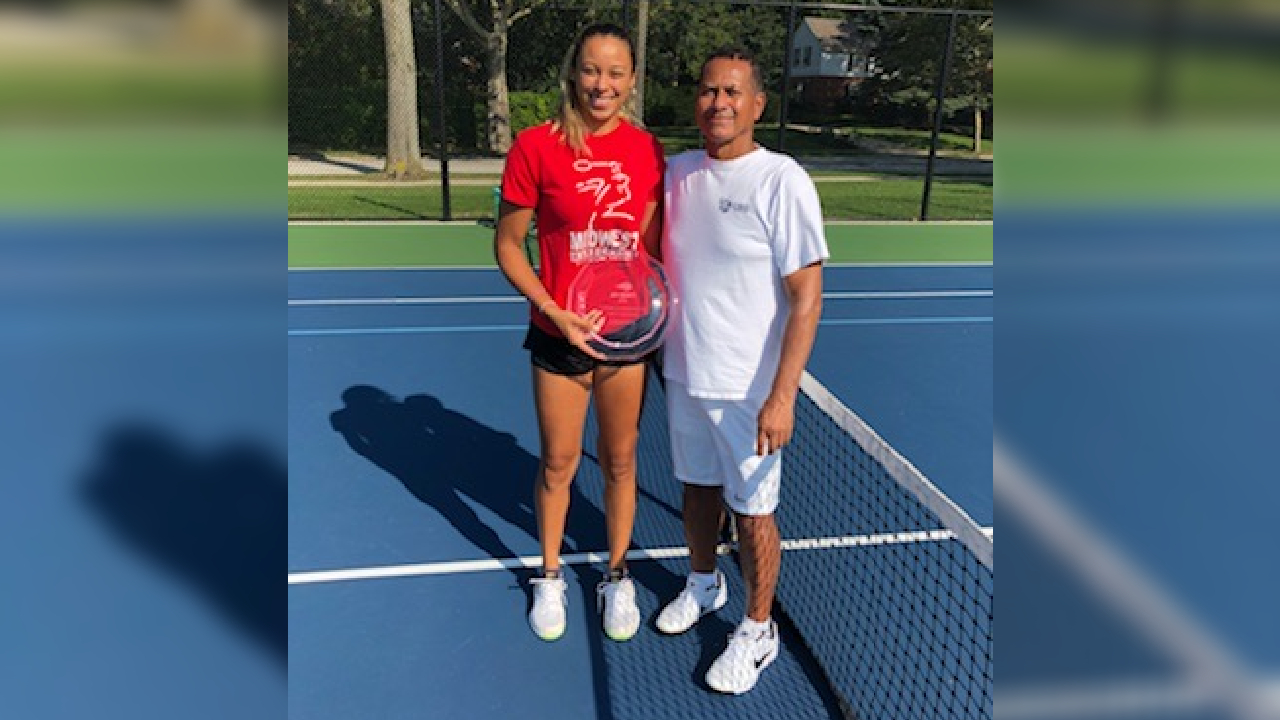
Tennis coach Rick Shy has made a career defying the odds
CLEVELAND (BVM) — Rick Shy had a difficult upbringing, growing up in the inner city of Cleveland, Ohio in a single-parent household. From a young age he was forced to be self-reliant.
“I had to deal with a lot of adversity growing up,” Shy said. “…I was one of seven kids. Our dad left my mother for another woman when I was four. [She] raised seven kids by herself while she was also working at a factory to make ends meet.”
Going into his teenage years, Shy began to see sports as a potential way to escape his situation. While he had grown up playing basketball, seeing tennis on television left him captivated and encouraged him to buy a tennis racquet to try to learn how to play.
“There was a tennis boom back in the 70s… Jimmy Connors and Chris Evert were No. 1 in the world at that time, and that was an influence for me to pick up a tennis racquet,” Shy said.
While tennis lessons were too expensive to be a reasonable investment, he would try to take the tips that pros gave other kids in their lessons, using them to teach himself how to play.
“I used to listen to tennis pros outside of the fence of the public courts,” Rick said. “I would take the tips that they gave to other kids, and start practicing and using those skills hitting against a wall.”
Through continuous practice, he improved his skills to the point where he could compete in matches against other kids on the public courts, which drastically improved his game. Because Shy’s high school didn’t have a very competitive tennis team, he continued to practice playing matches on the public courts until it was difficult for him to find competition.
While Shy’s matches not being officially sanctioned made it difficult for colleges to recruit him, fate worked out in his favor.
“The head coach at Alcorn State University, an HBCU, was from Cleveland,” Shy said. “I knew him from the tennis community. When he was offered the position he asked me to come along…I was there on a tennis scholarship playing Division I.”
While Shy had aspirations of playing professionally, travel and miscellaneous costs could accumulate to 50 to 60 thousand dollars per year, a price that Shy was not able to afford in order to give that dream a shot. Instead, Shy became a tennis coach, achieving certification by both the United States Professional Tennis Association and the Professional Tennis Registry.
Despite being extremely qualified for the profession, Shy faced discrimination that greatly limited his clientele, as some local tennis clubs wouldn’t allow Black athletes to play on their courts, or to enter the building.
“Years ago, Blacks and Jews were not allowed to enter or join [clubs],” Rick said. “I was once escorted out… by security because I wasn’t a member. When [I was] hired years later, I saw a member in the hallway and they laughed because they said years ago they wouldn’t have allowed me to enter the club.”
Between the discrimination that limited Shy’s opportunities to teach, and five different tennis clubs where he worked closing down for various reasons, he never gave up on his tennis dream. Shy continued to coach, leading some of the kids that he worked with to unprecedented success in the Cleveland area.
Two of the most talented players that he coached included Dalayna Hewitt and Abigail Desiatnikov. Shy began coaching Hewitt when she was 11, and she quickly skyrocketed to being one of the top youth talents in the United States. He started coaching Desiatnikov from an early age until she was around 12 years old, helping her reach even greater heights in her youth. Shy’s training allowed both players to rapidly progress.
“What I did was unusual,” Shy said. “Abby (Desiatnikov) and Dalayna never went to clinics, they just did one-on-one private lessons. I trained Dalayna two hours per day, five or six days per week, which is how she progressed so well. I would train her for two hours in the morning and she would do match play in the evening along with workouts.
“I started coaching Abby when she was three. I was also training her five to six days per week as she got older. She also had a workout routine in the gym that she would do every day. In the evenings, she would do match play, playing older and better players to get better.”
Hewitt became a top player on the junior tennis circuit in both singles and doubles, playing in all four junior grand slams. In the 2018 U.S. Open juniors, she and Hailey Baptiste reached the doubles final. They fell to Coco Gauff and Caty McNally, a doubles pairing that would go on to reach the final of the U.S. Open in 2021 in the professional ranks. Now, Hewitt plays professionally as well, looking for her breakthrough into a grand slam.
Desiatnikov became a youth tennis prodigy of sorts, winning the highly prestigious Orange Bowl and beating young professional players.
“After nine years of training, Abby won the Orange Bowl, the second most important junior international tennis tournament in the U.S.,” Shy said. “Abby won her first USTA tournament (10 and under) at age six. She had an agent at age 12. Some of the players she used to beat were teenage millionaires on the WTA tour.”
Now, Desiatnikov, a “Blue Chip” five-star recruit out of high school, plays tennis for the University of San Diego.
While coaching some of the most talented young players in the United States, Shy has continued to use tennis to give back to the community that he was raised in, offering opportunities for kids to play what has historically been a very expensive and exclusive sport.
“It’s always been a priority for me as a tennis pro to try to expand opportunities to play the sport into the inner city,” Shy said. “I’ve given tennis lessons for free in the inner city, in East Cleveland…I’ve also taught kids at the Forest City Tennis Club, one of the oldest inner city tennis clubs in the United States, and at Advantage Cleveland. But, it’s a challenge, because it’s difficult to see the value in tennis when you’re just trying to survive on a daily basis.”
Shy continues to teach professionally in Cleveland after more than 40 years, where he coaches players of all levels, regardless of socioeconomic status. In doing so, he is giving opportunities for kids to live the dream that Shy worked to make possible for himself.




